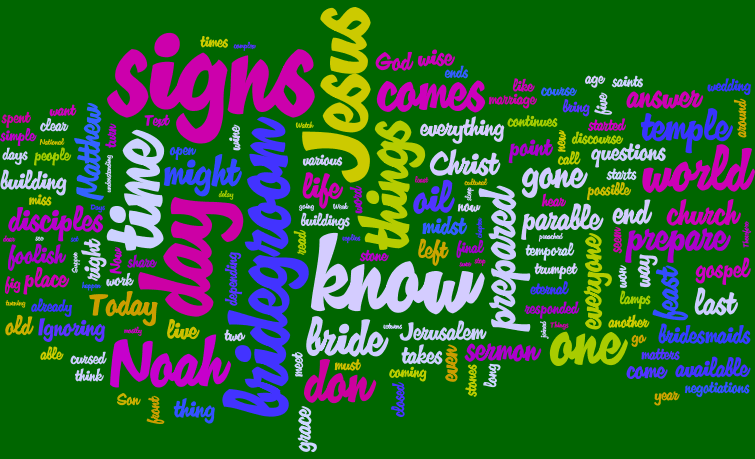I was sitting in my office fresh from vacation. The translation for the week was done. I was trying to scrape the rust off the brain. Half-heartedly skimming somebody’s commentary on the gospel of the week. When I felt a breeze. But it wasn’t the AC kicking on and refilling the tubes. Instead it was an old friend.
“Dr. Luther, I didn’t know if I’d ever see you again. I got the feeling the last time we talked it might be the last time. And that was quite a while ago. About 7 years”
“Seven years? You’ve got to remember, time for me isn’t quite linear anymore. Worms feels like yesterday. So that little conversation of ours was just this morning. But I did notice that you seem to have moved. And not a small one. You know, other than my trip to Rome, which was only about 850 miles, I don’t think I ever traveled more than 75 miles away from my hometown. And you are sitting on the other end of a continent! And it is hot. Are you sure you didn’t move closer to hell?”
“Yeah. That might have been an undercurrent in that conversation earlier this morning. Remember how von Staupitz sent you on that Roman trip. Said, ‘you need to see the city.’ Sometimes in our common work of the gospel you need to be somewhere else. At least that is what we tell ourselves.”
“But it seems to have worked. The black dog was at your door last time, and I hear no barking now. Although these little chats are never without purpose. I don’t get released from Leo X and Charles V for chit-chat.”
“You are going to have to tell me about those chats.”
“You’ll get your own one day. Mark 7. That’s what you are pondering.”
“Yes. It is just so unnatural. It is all law, but the law is usually natural. We call it cancel culture – driving out the unclean – but it is really larger than that. Parents spend inordinate amounts of time and money trying to control their kids peer groups. Our own synod excommunicated a 20 year old recently, basically for hanging out with the the wrong sorts. All of that seems natural, like practical wisdom. Hygiene. Yet Christ says, ‘there is nothing outside a person that by going into him can defile him.’ And the received understanding immediately jumps to Jesus eating with ‘tax collectors and sinners.’ But this passage has been used to justify all kinds of terrible stuff. Material that is clearly not good for anything, but the second you say so, somebody stands up and calls you a Pharisee or a legalist.”
“I did say the proper separation of law and gospel was the hardest skill in all of Christendom. And the one most necessary.”
“Yes. And I don’t think we’ve done that right here in a long time.”
“Keep talking.”
“The context that Jesus is talking about is piety practices. Hand and cup washings, pledges to God, for lack of a better word ‘religious acts.’ Things that might have started out as helpful to faith, but have become the entire purpose replacing faith. Practicing magic. Virtue Signaling. In your day, indulgences, pilgrimages and relics.”
“Yes, those were big things in my day. But it isn’t like every age doesn’t have their own.”
“But ours are so strange. In the Epistle Paul talks about putting on the armor. Know you are in a fight. Yet the religious act of our day seems to be ‘strip it all off and walk naked, otherwise you don’t have faith.’ Any law is a bad law and contrary to the gospel.”
“You might have something there Brown. Continue.”
“The core seems to be ‘whatever goes into a person from outside cannot defile him, since it enters not his heart but his stomach.’ It is about the heart. There are things from the outside that can enter the heart and displace true faith. There are also all kinds of things that exit the heart. ‘Out of the heart of man come evil thoughts, etc.’ The breaking of the entire 10 commandments. The heart itself is initially unclean. But the Christian has had a new heart created in them by baptism and the Spirit.”
“Now you are dividing the law and the gospel. Can you bring it home?”
“The breastplate of righteousness. The breastplate is what covers the heart. Eating with ‘sinners and tax collectors’ will not make you unclean. As long as it isn’t your heart that is desiring to join in ‘all these evil things.’ If your heart is acting out of faith it is protected by that righteousness and would not join in those works. Not all the demons could make you. You can stand in the evil day.”
“Ok, but haven’t you just made another religious work, Brown?”
“I don’t think so, because it is all borrowed armor. It is not our breastplate, but that given to us by Christ. It is not our heart, but the one created anew by the Spirit. We’ve been given these gifts not to bury them, but to use them. Not to discard them, but to wear them for the battle that rages.”
The great man walked out muttering something about it being too hot and Leo called. And then the AC kicked on flapping the pipes and jolting me from my seat.









